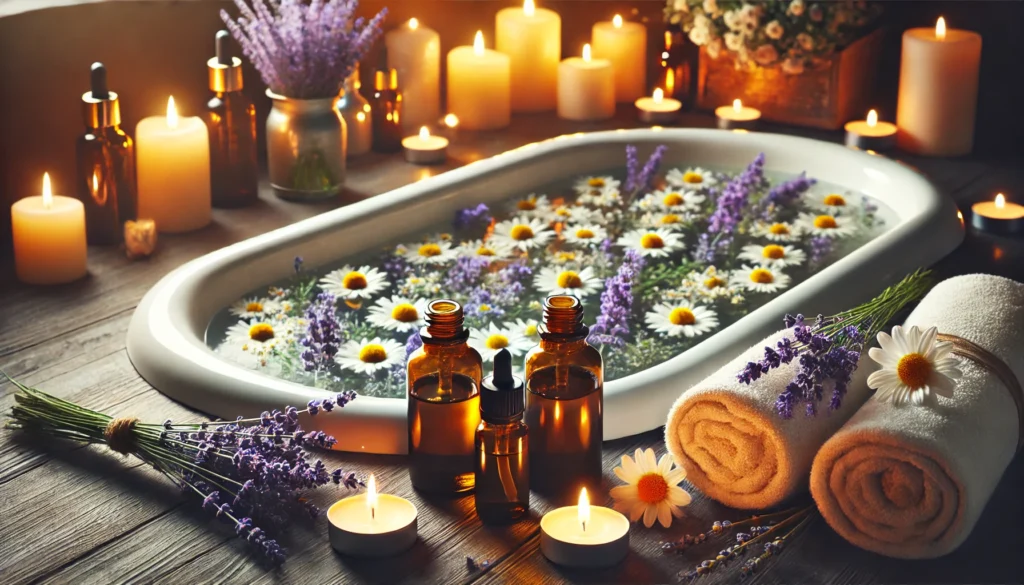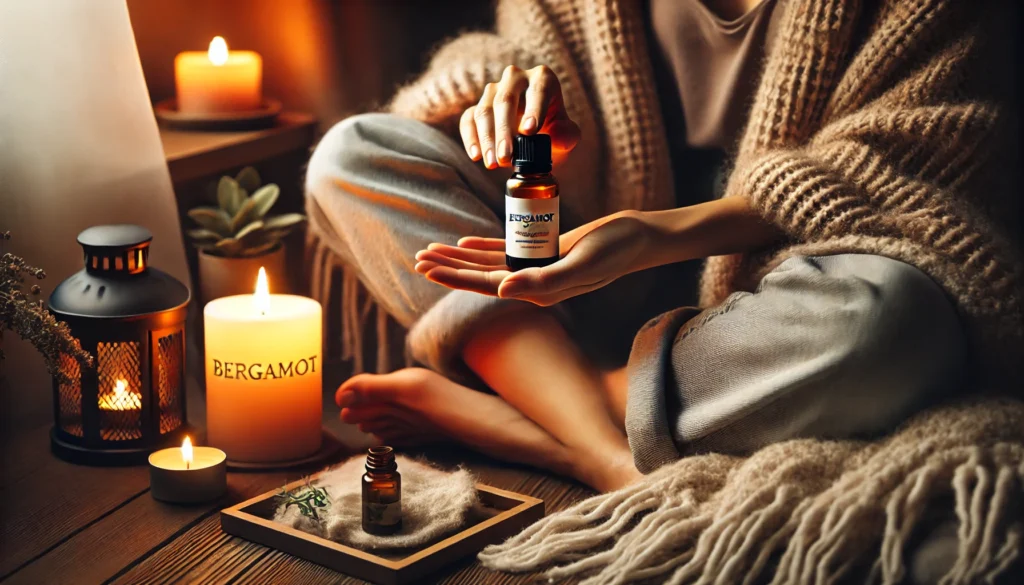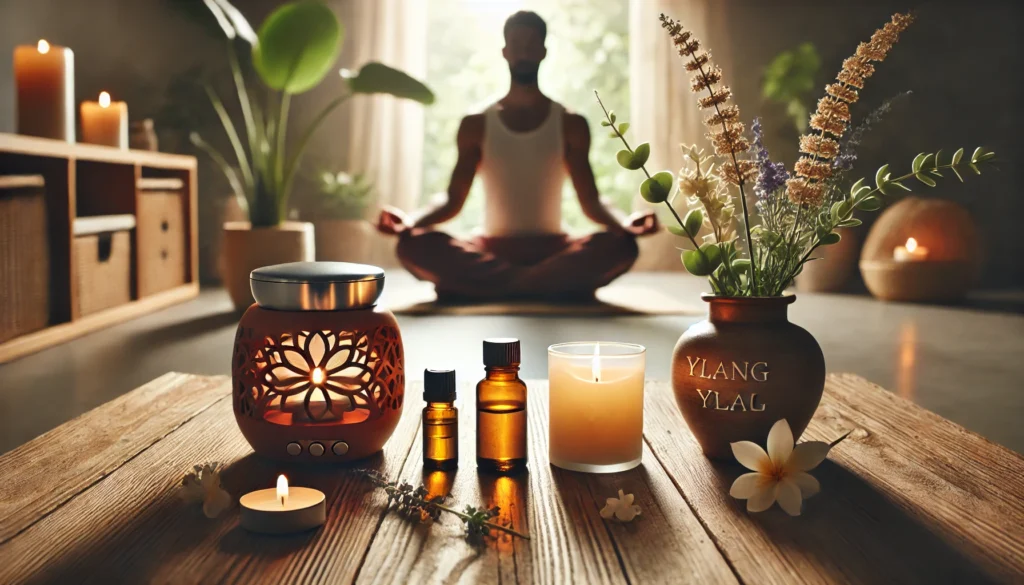In our fast-paced, modern world, stress has become an inevitable companion for many. While there are numerous ways to address stress, aromatherapy offers a natural and holistic approach. Through the strategic use of essential oils, individuals can find a soothing balm for their nerves. This article delves into the science, history, and practical applications of essential oils in stress relief.
You may also like: Top 10 Herbs for Stress Relief
The Science Behind Aromatherapy
Aromatherapy utilizes the olfactory system, the sensory system used for smelling, to deliver essential oils to our brains. The olfactory system is directly linked to the limbic system, which governs emotions, memories, and arousal. When we inhale certain scents, they can trigger emotional responses and potentially alleviate stress.
The Olfactory-Limbic Connection
The olfactory system and limbic system are intricately linked, creating a direct pathway for scents to influence emotions. When you inhale an essential oil, the molecules travel through the nose to the olfactory bulb. This bulb transmits signals to the limbic system, which includes structures like the amygdala and hippocampus, responsible for processing emotions and memories. This connection explains why certain smells can instantly evoke memories or alter mood, providing a scientific basis for aromatherapy’s effectiveness in stress relief.
Neurotransmitter Modulation
Scientific research has shown that certain essential oils contain compounds that can influence neurotransmitter activity in the brain, promoting relaxation and reducing feelings of anxiety. For instance, linalool and linalyl acetate, found in lavender, have been observed to modulate the GABAergic system, which is responsible for inhibiting nerve transmission in the brain, leading to calming effects. GABA (Gamma-Aminobutyric Acid) is a neurotransmitter that reduces neuronal excitability, and its increased activity can result in a tranquil state of mind.
Research on Essential Oils and Stress
Numerous studies have explored the relationship between essential oils and stress reduction. Research indicates that essential oils can impact physiological markers of stress, such as heart rate and cortisol levels. A study published in the Journal of Alternative and Complementary Medicine found that participants who inhaled lavender essential oil experienced a significant decrease in anxiety levels. Such findings emphasize the potential of aromatherapy as a complementary approach to managing stress.

Historical Context of Aromatherapy
The use of aromatic plants dates back to ancient civilizations. The Egyptians used essential oils in religious ceremonies and for embalming purposes. Meanwhile, the Greeks and Romans valued aromatic baths and massages. In traditional Chinese medicine, plant extracts were used to balance the body’s energy.
Egyptian Practices
The ancient Egyptians were pioneers in the use of essential oils, utilizing them in a variety of ceremonial and practical contexts. Oils like frankincense and myrrh were prized for their spiritual significance and antibacterial properties. Egyptians also employed these oils in the mummification process, believing that they helped preserve the body for the afterlife. The reverence for aromatic substances in Egypt underscores their longstanding value in human culture.
Greek and Roman Influences
The Greeks and Romans further developed the use of aromatic plants, incorporating them into their daily lives. Greek physicians, like Hippocrates, advocated for the therapeutic use of aromatic baths and massages. Romans adopted these practices, enhancing their bathing rituals with fragrant oils to promote relaxation and health. These civilizations laid the foundation for the development of Western aromatherapy techniques.
Traditional Chinese Medicine
In traditional Chinese medicine, plant extracts have been used for thousands of years to restore balance and harmony within the body. Essential oils were part of holistic treatments aimed at aligning the body’s energy, or “qi.” Different scents were believed to affect various organs and emotions, demonstrating an early understanding of the mind-body connection that is now a core principle of aromatherapy.

Popular Essential Oils for Stress Relief
Lavender
Lavender is perhaps the most renowned essential oil for stress relief. Its soothing aroma is known to calm the mind and promote restful sleep. Studies have demonstrated that lavender can reduce anxiety levels and improve mood.
Calming Properties
Lavender’s calming properties are attributed to its ability to reduce cortisol levels, the stress hormone that can wreak havoc on the body when elevated. By mitigating cortisol production, lavender helps to calm the nervous system and promote a sense of peace.
Sleep Enhancement
Beyond its calming effects, lavender is widely recognized for its ability to improve sleep quality. Inhaling lavender oil before bedtime can help facilitate relaxation, making it easier to fall asleep and enjoy a restful night’s sleep. This makes it a popular choice for those suffering from insomnia or sleep disturbances.
Anxiety Reduction
Research has shown that lavender can significantly reduce symptoms of anxiety. In clinical trials, participants exposed to lavender aroma reported lower levels of anxiety and stress, highlighting its potential as a natural anxiolytic. These findings support the widespread use of lavender in stress management practices.
Chamomile
Chamomile’s sweet, apple-like scent has been used for centuries as a natural remedy for anxiety. Known for its anti-inflammatory and calming properties, chamomile essential oil is particularly effective in reducing stress-induced headaches and muscle tension.
Anti-Inflammatory Effects
Chamomile contains compounds that exhibit anti-inflammatory effects, making it effective in soothing physical symptoms of stress, such as muscle tension and headaches. These properties make chamomile a versatile essential oil for both emotional and physical stress relief.
Emotional Soothing
The soothing scent of chamomile is known to calm the mind and alleviate feelings of anxiety. Its gentle aroma can create a sense of tranquility, making it an ideal choice for individuals seeking to unwind after a stressful day. Chamomile’s calming effects have been recognized throughout history, contributing to its enduring popularity.
Historical Usage
Chamomile has a rich history of use in traditional medicine for its calming effects. Ancient cultures, including the Egyptians and Greeks, utilized chamomile in herbal remedies for its ability to promote relaxation and alleviate anxiety. This historical context underscores its lasting significance in stress management.
Bergamot
Bergamot, a citrus fruit, offers a refreshing and uplifting scent. Its essential oil is known for its mood-enhancing properties. Research suggests that bergamot can reduce cortisol levels, the body’s primary stress hormone, making it an excellent choice for stress relief.
Mood Enhancement
Bergamot’s bright and uplifting aroma is known to enhance mood and promote a positive outlook. Its citrusy scent can invigorate the senses, making it an effective tool for combating feelings of sadness or depression.
Cortisol Reduction
Studies have demonstrated that bergamot essential oil can lower cortisol levels, helping to alleviate stress and its associated symptoms. By reducing this stress hormone, bergamot supports overall well-being and resilience to stressors.
Aromatic Benefits
The aromatic benefits of bergamot extend beyond mood enhancement. Inhaling its scent can lead to physiological changes, such as reduced heart rate and blood pressure, which contribute to its stress-relieving effects. These properties make bergamot a valuable addition to any aromatherapy regimen.
Ylang Ylang
Ylang Ylang’s exotic floral aroma is not only intoxicating but also deeply relaxing. This essential oil can help reduce blood pressure and heart rate, alleviating stress and promoting a sense of well-being.
Cardiovascular Benefits
Ylang Ylang has been shown to have cardiovascular benefits, including the ability to lower blood pressure and heart rate. These effects can create a sense of calm and relaxation, making it an effective remedy for stress-induced physical symptoms.
Emotional Balance
The scent of Ylang Ylang is known to promote emotional balance and alleviate feelings of anxiety or anger. Its calming influence can help stabilize mood swings and encourage a sense of inner peace, making it a valuable tool for emotional well-being.
Sensory Experience
The sensory experience of Ylang Ylang’s aroma is both captivating and soothing. Its floral scent can transport the mind to a serene state, providing a mental escape from daily stressors. This sensory journey enhances its appeal in aromatherapy practices.

Current Trends in Aromatherapy
The growing interest in holistic health has spurred innovations in aromatherapy. From wearable diffusers to AI-powered devices that release scents based on real-time stress levels, the market is evolving rapidly.
Wearable Technology
Wearable diffusers represent a significant advancement in the accessibility of aromatherapy. These portable devices allow individuals to experience the benefits of essential oils on the go, providing a discreet and convenient solution for stress relief. The integration of aromatherapy into wearable technology highlights the modern appeal of this ancient practice.
Smart Aromatherapy Devices
The advent of AI-powered aromatherapy devices has revolutionized the way individuals interact with essential oils. These smart devices can analyze real-time data, such as heart rate and stress levels, to release personalized scents that target specific needs. This innovation underscores the potential of technology to enhance the efficacy of aromatherapy.
Everyday Products
The integration of essential oils into everyday products, such as candles, bath products, and skincare, has expanded their accessibility. This trend reflects a broader movement towards incorporating natural remedies into daily life to manage stress and enhance well-being. The widespread availability of essential oil-infused products demonstrates the growing demand for holistic solutions.
Practical Applications of Aromatherapy
Diffusion
Using an essential oil diffuser is one of the most effective ways to experience aromatherapy. By dispersing a fine mist of essential oils into the air, diffusers allow you to inhale the calming scents and enjoy their stress-relieving benefits.
Types of Diffusers
There are various types of diffusers, each offering unique advantages. Ultrasonic diffusers use water to disperse essential oil molecules into the air, creating a gentle mist. Nebulizing diffusers, on the other hand, release undiluted oils for a more potent aromatic experience. Choosing the right diffuser can enhance the effectiveness of aromatherapy.
Creating a Relaxing Environment
Setting up a diffuser in your living space can create a calming atmosphere conducive to relaxation. Selecting essential oils like lavender or chamomile can further enhance this ambiance, promoting a sense of tranquility and well-being. The simple act of diffusing oils can transform a room into a sanctuary of peace.
Timing and Frequency
To maximize the benefits of diffusion, consider the timing and frequency of use. Short, regular intervals of diffusion can provide consistent stress relief, while longer sessions may be ideal for unwinding at the end of the day. Experimenting with different schedules can help tailor aromatherapy to your personal needs.
Topical Application
Essential oils can be applied to the skin when diluted with a carrier oil. This method is particularly effective for localized stress relief, such as massaging lavender oil onto the temples to relieve tension headaches.
Choosing Carrier Oils
Selecting an appropriate carrier oil is crucial for safe topical application. Options like jojoba, coconut, and almond oil are popular choices due to their moisturizing properties and skin compatibility. Diluting essential oils in a carrier oil ensures that they are gentle on the skin while retaining their therapeutic benefits.
Targeted Massage Techniques
Incorporating essential oils into massage can enhance their stress-relieving effects. Techniques such as circular motions or acupressure can target tension points, providing relief from stress-induced discomfort. Massaging oils onto areas like the neck and shoulders can alleviate physical symptoms of stress.
Skin Sensitivity Considerations
When applying essential oils topically, it’s important to consider skin sensitivity. Conducting a patch test before full application can help identify any adverse reactions. Adjusting the dilution ratio or selecting a different oil can ensure a safe and effective experience.
Bathing
Adding a few drops of essential oils to a warm bath creates a spa-like experience at home. The combination of heat and scent can deeply relax the body and mind, melting away stress.
Preparing the Bath
Creating an aromatic bath involves selecting essential oils that promote relaxation, such as lavender or chamomile. Adding the oils to the water just before entering the bath can ensure maximum scent dispersion. This preparation transforms a simple bath into a luxurious, stress-relieving ritual.
Enhancing the Experience
To enhance the bathing experience, consider incorporating additional elements like Epsom salts or bath bombs infused with essential oils. These additions can provide added therapeutic benefits, such as muscle relaxation and skin nourishment. The overall experience can create a holistic retreat from daily stressors.
Post-Bath Relaxation
After a soothing bath, extending the relaxation period can amplify the benefits. Consider engaging in calming activities like reading or meditation to prolong the tranquil state. The transition from a stress-relieving bath to a peaceful evening routine can reinforce the effects of aromatherapy.
Future Implications of Aromatherapy
As scientific research on essential oils continues to grow, so does the potential for new applications. Emerging studies are investigating the role of essential oils in cognitive function, sleep quality, and mental health disorders. These findings could pave the way for aromatherapy to be integrated into more formal healthcare settings, offering complementary solutions for stress and anxiety management.
Cognitive Function
Research into the impact of essential oils on cognitive function is gaining traction. Preliminary studies suggest that certain oils, like rosemary, may enhance memory and concentration. As evidence builds, aromatherapy could become a valuable tool for cognitive health, supporting mental clarity and focus.
Sleep Quality
The influence of essential oils on sleep quality is another promising area of study. Oils like lavender and chamomile are already known for their sleep-enhancing properties, but ongoing research aims to uncover the mechanisms behind these effects. Understanding how essential oils can improve sleep hygiene could lead to their integration into sleep disorder treatments.
Mental Health Applications
The potential of aromatherapy in mental health care is being explored with increasing interest. Essential oils may offer complementary benefits for conditions like anxiety and depression, providing non-invasive support for traditional treatments. Continued research could establish aromatherapy as a recognized component of mental health care strategies.
Conclusion
Aromatherapy offers a promising avenue for stress relief through its natural and holistic approach. By understanding the science behind essential oils and their historical significance, we can appreciate their role in modern wellness practices. Whether through diffusers, topical applications, or scented baths, essential oils provide a pathway to tranquility in our hectic lives.
For health and wellness coaches, science journalists, and biohackers alike, essential oils represent an intriguing intersection of ancient wisdom and contemporary science. As we continue to explore their potential, essential oils are poised to remain a vital tool in the quest for stress relief and overall well-being.
Further Reading:
The Best Essential Oils for Stress Relief and How to Use Them
Can You Reduce Stress With Aromatherapy?
Important Note: The information contained in this article is for general informational purposes only, and should not be construed as health or medical advice, nor is it intended to diagnose, prevent, treat, or cure any disease or health condition. Before embarking on any diet, fitness regimen, or program of nutritional supplementation, it is advisable to consult your healthcare professional in order to determine its safety and probable efficacy in terms of your individual state of health.
Regarding Nutritional Supplements Or Other Non-Prescription Health Products: If any nutritional supplements or other non-prescription health products are mentioned in the foregoing article, any claims or statements made about them have not been evaluated by the U.S. Food and Drug Administration, and such nutritional supplements or other health products are not intended to diagnose, treat, cure, or prevent any disease.


